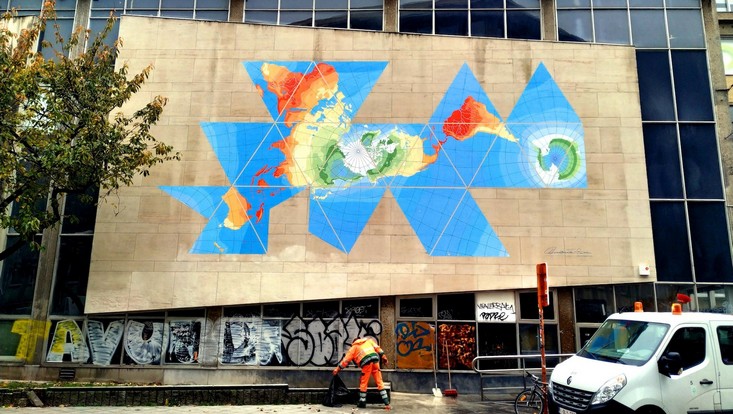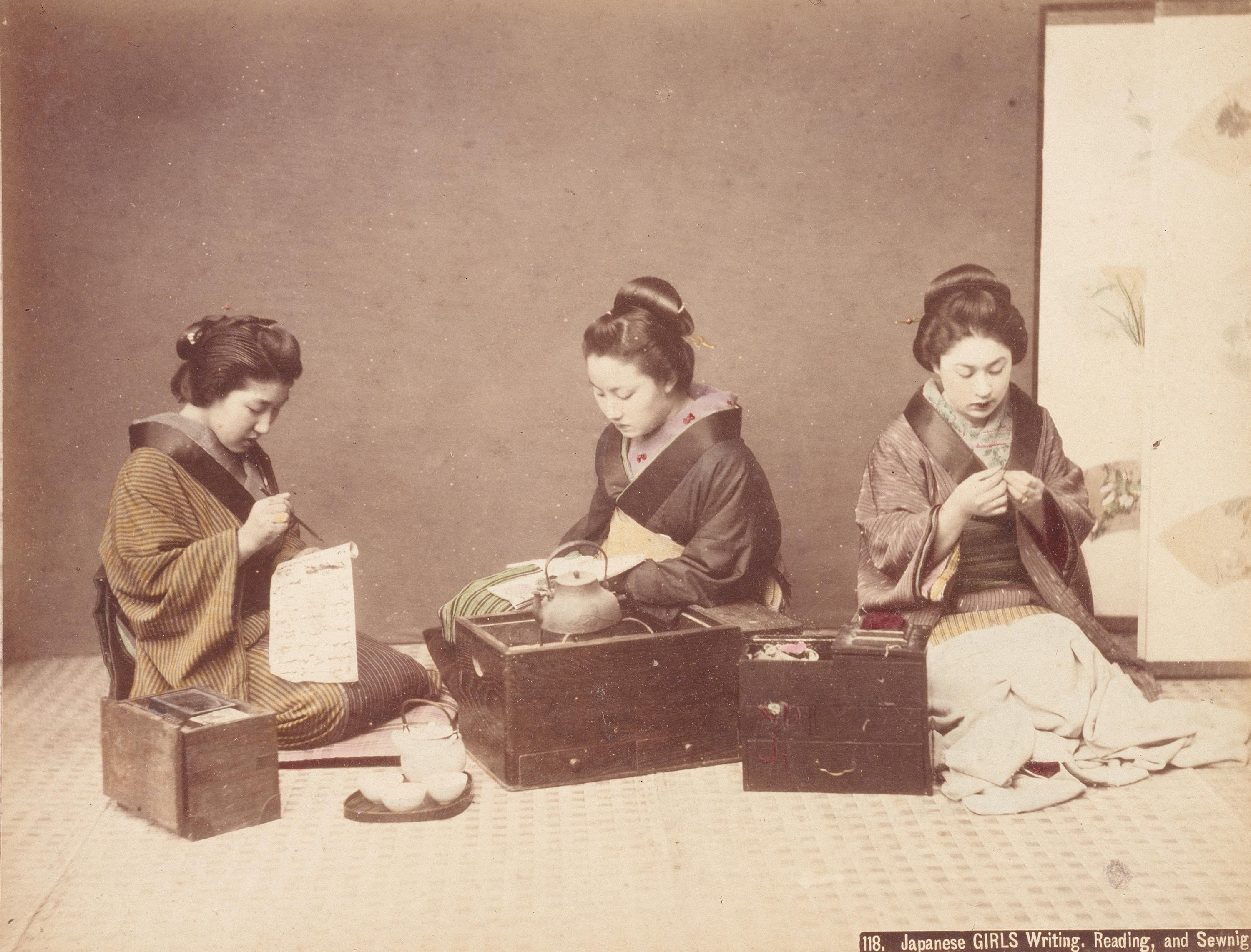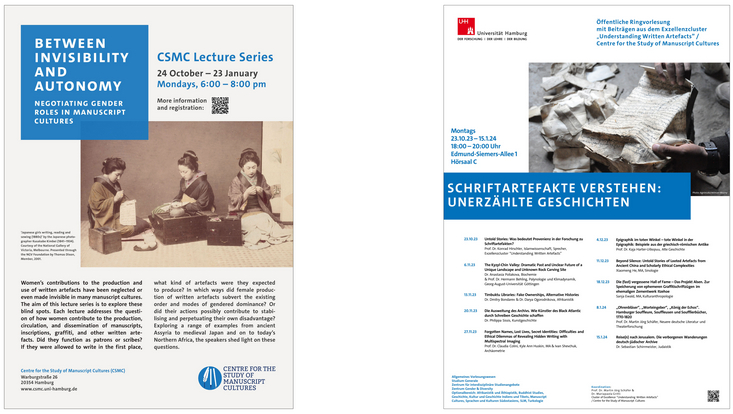Equity & Diversity Lecture Series
Which writers, writing practices, and written artefacts have been valued and celebrated and which ones have been resisted or marginalised in and across writing cultures? Who, across manuscript cultures, has been allowed to write in the first place? And which producers of artefacts, kinds of writing, and ways of thinking about writing have been centered in the disciplines that study written artefacts? Which contexts and understandings of writing have, instead, been neglected or erased? What has led to these emphases and to these exclusions?
We explore these questions in lecture series held every Winter Semester and open to both academic and non-academic audiences.
Overview
2024/2025: Written Artefacts across World Regions
Written Artefacts across World Regions: Incommensurabilities and Comparisons
Lecture Series (hybrid format)
Convenors: Mariapaola Gritti and Martin-Jörg Schäfer

In the Winter Semester 2023/24, the Cluster of Excellence ‘Understanding Written Artefacts’ at the Centre for the Study of Manuscript Cultures convened the lecture series ‘Understanding Written Artefacts: Untold Stories / Schriftartefakte verstehen: Unerzählte Geschichten’ to explore aspects of written artefacts that have not yet been brought to the foreground of scholarly conversations in written artefact studies. The series also reflected on some of the cultural and disciplinary norms and ethical challenges that have shaped written artefact research so far. This year’s lecture series aims to expand these conversations on the (changing) norms, emphases, and trajectories of development that characterise contemporary written artefact research by presenting materials and perspectives from across world regions, and specifically from beyond Euro-American scholarly centres. In making room for further ‘untold stories’, we want to focus particularly on the connections – the similarities, the entanglements, but also the incommensurabilities – that emerge when we look at research on artefacts originating from or located in different regions or at research informed by different scholarly and conservation traditions as well as by different cultural and political contexts. We hope that contributions to the series will enable us to discuss the powers and pitfalls of cross-cultural comparison as a productive yet also potentially limiting approach in written artefact research. Comparisons can sharpen our sensibility for the cross-cultural diversity of written artefacts and writing practices, but also stifle our capacity to convey radically diverse modes of knowledge and practice to our audiences. What aspects of written artefacts and of writing practices invite or, instead, defy comparisons? What insights can comparisons yield, what understandings might they obscure? And what thematic, methodological, and epistemological expansions can a focus on cross-cultural or cross-regional incommensurabilities help us envision? Lectures in the series will explore these questions by looking at case studies from Algeria, India, Iran, Mali, Mexico, Thailand, and Yemen.
The series comprises lectures in Arabic, English, French, and Spanish. Consecutive interpretation into English will be provided for the lectures in Arabic, French, and Spanish.
The series will be presented in hybrid format. We look forward to having you with us in the lecture hall, or alternatively on Zoom.
All lectures will be held on Mondays, 6:15 pm — 8:00 pm CET, at Erwin-Panofsky Hörsaal (ESA C), Hauptgebäude, Edmund-Siemers-Allee 1, and online (ZOOM).
| Date | Lecturer | Title |
| 14 October 2024 |
Hanna Wimmer, Art History Cluster of Excellence ‘Understanding Written Artefacts’ at the Centre for the Study of Manuscript Cultures, University of Hamburg |
Introduction – Written Artefacts across World Regions: Incommensurabilities and Comparisons |
| 21 October 2024 |
María Isabel Álvarez Icaza Longoria, Art History Universidad Nacional Autónoma de México, Mexico City, Mexico – in Spanish with interpretation into English |
La atribución regional y cultural de los manuscritos mesoamericanos calendáricos-rituales-adivinatorios / The Regional Culture Attribution of Calendrical-Ritual-Divinatory Mesoamerican Manuscripts |
|
28 October 2024 |
Mohammed Tawaf, History École nationale des chartes, Paris, France – in Arabic with interpretation into English |
Archives and Archival Practices in Yemen |
| 11 November 2024 |
M.V. Muralikrishnan, Vedic Studies Vadakke Madham Brahmaswan, Thrissur, India |
Key Features and Significance of the Manuscripts in the Panthal Collection: An Important Collection within the DiPiKA Project |
| 18 November 2024 |
Nathael Cano, Heritage Conservation Universidad Nacional Autónoma de México, Mexico City, Mexico |
Pictographic Manuscripts from New Spain: The Heritage Science Approach |
| 25 November 2024 |
Djibril Dramé, African Studies The British Library, London, United Kingdom |
Malian Manuscripts through the Lens of Jenne: Socio-Linguistic Diversity in Digitised Collections |
|
2 December 2024 |
Thaneerat Jatuthasri, Thai Studies Chulalongkorn University, Bangkok, Thailand |
Investigating Thai Court Dance-Drama Manuscripts: Texts, Paratexts, and Text-Performance Relations |
| 9 December 2024 |
Djamel-Eddine Mechehed, Archival Studies & Codicology Lmuhub Ulahbib Manuscript Library, Béjaïa, Algeria – in French with interpretation into English |
L'exploitation codicologique de la collection de manuscrits (arabes et berbères) de Lmuhub Ulahbib - Kabylie, Algérie / The Codicological Study of the (Arabic and Berber) Manuscript Collection of Lmuhub Ulahbib in Kabylia, Algeria |
|
16 December 2024 |
Elaheh Shahpasand, Qur’ānic Studies University of Qur’ānic Sciences at Mashhad, Mashhad, Iran |
The Impact of the Idea of “the Masculinity of the Qur’ān” on Ten Qur’ānic Readings, with Case Studies from the Astan Quds Razavi Manuscript Library in Mashhad, Iran |
2023/2024: Untold Stories
Understanding Written Artefacts: Untold Stories
Lecture Series (hybrid format)
Convenors: Mariapaola Gritti and Martin-Jörg Schäfer
Since 2019, the Cluster of Excellence "Understanding Written Artefacts" at Universität Hamburg has investigated written artefacts (manuscripts, inscriptions, etc.) originating in different times – from the beginning of writing up until today – and in different regions of the world. Artefacts studied range at present from Mesopotamian clay tables to the graffiti sprayed on Hamburg’s walls. The lecture series presents this research and by doing so explores the geographical, cultural, and historical diversity of written artefacts and of writing as a human practice. At the same time, it raises the question of which aspects of written artefacts, of the historical contexts from which they stem, and of the social contexts in which they are used we have as of yet failed to consider or account for. Which creators and users of written artefacts and which types of artefacts have we deemed (un-)worthy of our attention? Whose perspectives on written artefacts have we incorporated into our research? What bodies of knowledge about written artefacts have we, instead, backgrounded? And what spoken and unspoken cultural and disciplinary norms have led to such marginalisations? With this lecture series we would like to begin telling some of the still-untold stories about writing and written artefacts that questions such as these bring into view.
The lecture series comprises talks in English and in German. It will be presented in hybrid format. We look forward to having you with us in the lecture hall, or alternatively on Zoom.
All lectures will be held on Mondays, 6:15 pm — 8:00 pm CET, at Erwin-Panofsky Hörsaal (ESA C), Hauptgebäude, Edmund-Siemers-Allee 1, and online (ZOOM)
| Date | Lecturer | Title |
| 23 October 2023 |
Konrad Hirschler Islamwissenschaft, Sprecher Exzellenzcluster „Understanding Written Artefacts“ / Centre for the Study of Manuscript Cultures |
Untold Stories: Was bedeutet Provenienz in der Forschung zu Schriftartefakten? |
|
6 November 2023 |
Anastasia Poliakova Biochemistry, Cluster of Excellence “Understanding Written Artefacts” / Centre for the Study of Manuscript Cultures & Hermann Behling Palynology and Climate Dynamics, Georg-August-Universität Göttingen |
The Kyzyl-Chin Valley: Dramatic Past and Unclear Future of a Unique Landscape and Unknown Rock Carving Site |
|
13 November 2023 In-person only (no Zoom session) |
Dmitry Bondarev & Darya Ogorodnikova African Studies, Cluster of Excellence “Understanding Written Artefacts” / Centre for the Study of Manuscript Cultures |
Timbuktu Libraries: Fake Ownerships, Alternative Histories |
|
20 November 2023 The lecture will be given via Zoom but will also be shown in the lecture hall |
Philippa Sissis Kunstgeschichte, Exzellenzcluster „Understanding Written Artefacts“ / Centre for the Study of Manuscript Cultures |
Die Ausweitung des Archivs. Wie Künstler des Black Atlantic durch Schreiben Geschichte schaffen |
| 27 November 2023 |
Claudia Colini, Kyle Ann Huskin & Ivan Shevchuk Archaeometry, Cluster of Excellence “Understanding Written Artefacts” / Centre for the Study of Manuscript Cultures |
Forgotten Names, Lost Lives, Secret Identities: Difficulties and Ethical Dilemmas of Revealing Hidden Writing with Multispectral Imaging |
| 4 December 2023 |
Kaja Harter-Uibopuu Alte Geschichte, Exzellenzcluster „Understanding Written Artefacts“ / Centre for the Study of Manuscript Cultures |
Epigraphik im toten Winkel – tote Winkel in der Epigraphik: Beispiele aus der griechisch-römischen Antike |
| 11 December 2023 | Xiaomeng He
Sinology, Cluster of Excellence “Understanding Written Artefacts” / Centre for the Study of Manuscript Cultures |
Beyond Silence: Untold Stories of Looted Artefacts from Ancient China and Scholarly Ethical Complexities |
| 18 December 2023 |
Sanja Ewald Kulturanthropologie, Exzellenzcluster „Understanding Written Artefacts“ / Centre for the Study of Manuscript Cultures |
Die (fast) vergessene Hall of Fame – Das Projekt Alsen. Zur Speicherung von ephemeren Graffitischriftzügen im ehemaligen Zementwerk Itzehoe |
|
8 January 2024 |
Martin Jörg Schäfer Neuere deutsche Literatur und Theaterforschung, Exzellenzcluster „Understanding Written Artefacts“ / Centre for the Study of Manuscript Cultures |
„Ohrenbläser“, „Worteingeber“, „König der Echos“. Hamburger Souffleure, Souffleusen und Soufflierbücher, 1770-1820 |
|
15 January 2024 |
Sebastian Schirrmeister Judaistik, Exzellenzcluster „Understanding Written Artefacts“ / Centre for the Study of Manuscript Cultures |
Reise(n) nach Jerusalem. Die verborgenen Wanderungen deutsch-jüdischer Archive |
2022/2023: Between Invisibility and Autonomy
Between Invisibility and Autonomy: Negotiating Gender Roles in Manuscript Cultures
Lecture Series (hybrid format)
Convenors: Eike Großmann and Johanna Seibert

Women’s contributions to the production and use of written artefacts have been neglected or even made invisible in many manuscript cultures. Their agency being written out is only one of the numerous blind spots when pursuing a gender perspective in the study of manuscript cultures. The aim of this lecture series is to explore precisely these blind spots by raising questions which enable us to grasp the multiple roles women have played in manuscript cultures. At the centre of each lecture lies the question of how women contribute to the production, circulation, and dissemination of manuscripts, inscriptions, graffiti, and other written artefacts. Did they function as patrons or scribes? If they were allowed to write in the first place, what kind of artefacts were they expected to produce? In which ways did female production of written artefacts subvert the existing order and modes of gendered dominance? Or did their actions possibly contribute to supporting, stabilising, and perpetuating their own disadvantage? How was their exclusion then rationalised and explained in cases where they were denied active (and passive) participation in manuscript cultures?
It is through perspectives such as these that women’s roles in historic and contemporary manuscript cultures become visible. Exploring a range of examples — liturgic, devotional, biographic, among many others, from ancient Assyria and Egypt to medieval Japan and Central Europe and on to today’s Thailand and Northern Africa — the speakers shed light on new findings, give unique insights into their fields, and discuss methodological considerations.
All lectures will be held on Mondays, 6:15 pm — 8:00 pm CET, at Warburgstraße 26 (Pavilion) and online (ZOOM)
| Date | Lecturer | Title |
| 24 October 2022 |
Cécile Michel Centre national de la recherche scientifique, Nanterre / Centre for the Study of Manuscript Cultures, Universität Hamburg |
Gender Studies and Manuscript Cultures: The Case of Assyriology |
|
1 November 2022 (Tuesday) |
Michael L. Norton James Madison University (Virginia, US) |
In Her Own Voice: Asserting Autonomy Through Liturgy at Klosterneuburg |
| 7 November 2022 |
Silpsupa Jaengsawang Centre for the Study of Manuscript Cultures, Universität Hamburg |
Women in Thai-Lao Manuscript Cultures: Alternative Worship of Text(ile) in Compensation of Monkhood |
| 21 November 2022 |
Melissa Moreton Institute for Advanced Study, Princeton |
Women as Scribes: Materials, Methods, and Motives in Medieval Italy and Beyond |
| 28 November 2022 |
Patricia Stoop Institute for the Study of Literature in the Netherlands (ISLN) / Ruusbroecgenootschap, Universiteit Antwerpen |
Women and Their Multiple Roles in Manuscript Production in the Late Medieval and Early Modern Low Countries |
| 12 December 2022 |
Michael Kohs Centre for the Study of Manuscript Cultures, Universität Hamburg |
Women as Scribes in Jewish Manuscript Cultures |
| 9 January 2023 | Leah Mascia
Centre for the Study of Manuscript Cultures, Universität Hamburg |
Nuns, Domestic Virgins, and Female Devotees in Late Antique Egypt: Evidence From Greek and Coptic Graffiti, Papyri, and Other Written Artefacts |
| 23 January 2023 |
Britta Frede Islamic Studies / Africa Multiple Cluster of Excellence, Universität Bayreuth |
Female Contributions to Islamic Text Production and Circulation |
|
30 January 2023 (Online only; lecture starts at 6:00 pm) |
Bryan Lowe Princeton University |
Patrons of Paper and Clay: Methods for Studying Women's Religiosity in Ancient Japan |

